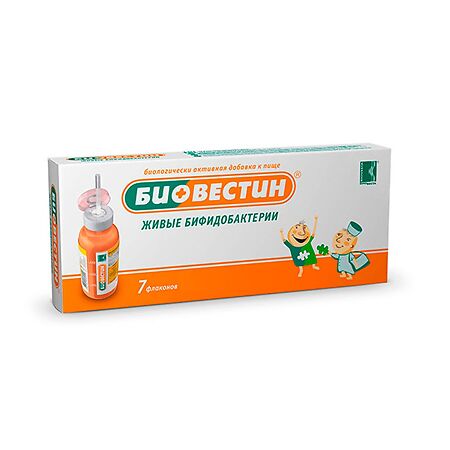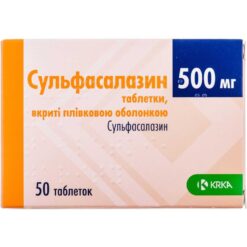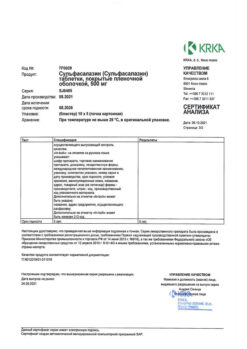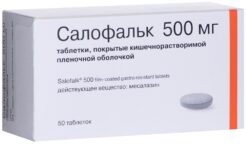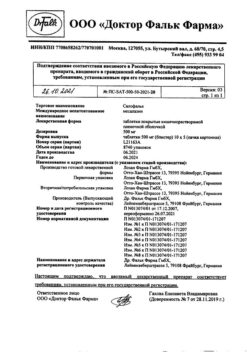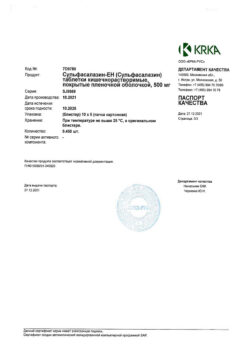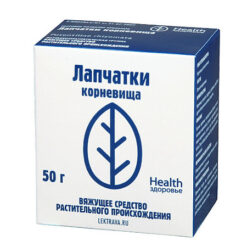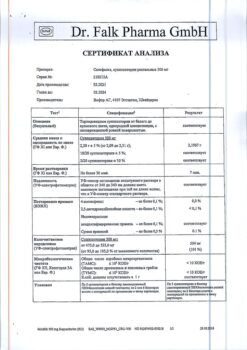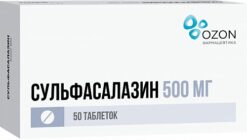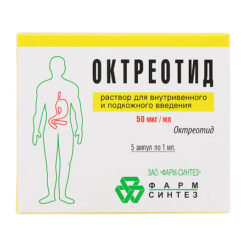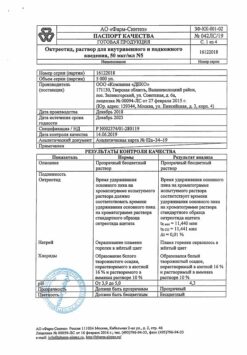No products in the cart.
Biovestin emulsion, 12 ml, 7 pcs.
€13.69 €11.87
Description
Biovestin used in the treatment of intestinal dysfunctions (constipation, bloating); dysbacteriosis of different origin due to the presence of conditionally pathogenic intestinal microflora, during pregnancy, during prenatal preparation, hormonal and radiation therapy; respiratory infections and for their prevention; various manifestations of food allergies; iron deficiency anemia, vitamin deficiency states.
The effect of the drug Biovestin is determined by the bifidobacteria of Adolescentis species (Bifidobacterium adolescentis MC-42) contained in its live active form.
. This strain of bifidobacteria is characterized by high growth rate, acid-forming ability and high antagonistic activity against a number of conditionally pathogenic and pathogenic microorganisms, such as Staphylococcus aureus 209 p, Shigella flexneri 170, Shigella flexneri 337, Shigella sonnei 174 b, Proteus vulgaris F-30, Proteus mirabilis F-196, Escherichia coli O-147.
The Bifidobacterium adolescentis MC-42 strain is resistant to therapeutic doses of common antibiotics and can be used already at the stage of antibiotic therapy to prevent dysbiotic changes.
Indications
Indications
To prevent complications during antibiotic therapy and chemotherapy and radiation therapy.
To correct the immune status, including in HIV-infected people.
To restore normal intestinal microflora, incl. nasointestinal probe and rectal endoscopic method.
To normalize microflora and improve the barrier function of human mucous membranes.
To improve the motor-evacuation function of the digestive system, restore the condition of the mucous membrane of the digestive tract.
To restore the activity of the immune system in often long-term ill children, often ill people, after acute infectious diseases, during seasonal epidemic diseases.
To prevent and reduce the severity of viral diarrhea.
For inflammatory diseases of the genitourinary system (cystitis, pyelonephritis, bacterial prostatitis, bacterial vaginosis, chronic salpingoophoritis).
To correct lipid metabolism.
To reduce external and internal toxic load on the body.
To protect against intoxication by harmful environmental chemicals.
For chronic stress, winter fatigue syndrome, chronic fatigue syndrome.
To increase endurance and sports performance in athletes of various qualifications
Composition
Composition
Bifidobacterium adolescentis (109 CFU/ml); bifidogenic factors and metabolic products of bifidobacteria
Contraindications
Contraindications
Individual intolerance to product components, milk protein intolerance. Consult your physician before use. Children from birth to 14 years old need to consult a pediatrician.
Short product description
Short product description
Dietary supplement Not a medicine.
Before use, it is recommended to consult a doctor (specialist).
Recommendations for use
Recommendations for use
Age
0 – 3 months – 0.5 ml 10 drops
3 months – 1 year – 1 ml 20 drops
1-3 years – 3 ml At the mark or ¼ fl
3-6 years – 6 ml At the mark or ½ fl
from 6 years and adults – 12 ml 1/1 bottle
Action
Action
Biovestin dietary supplement is an additional source of bifidobacteria and promotes the restoration of symbiont microflora (SM).
Immunomodulatory. Symbiont microflora has universal immunomodulatory properties. Main immunomodulatory
mechanisms are provided by bifidobacteria and lactobacilli. Colonization of the intestinal epithelium by bifidobacteria during interaction on the surface of M-cells of Peyer’s patches leads to stimulation of lymphoid tissue, enhancement of innate immune reactions of the cellular and humoral immunity, and activation of cytokine production. Secretory IgA, produced with the direct participation of the normal flora of the mucous membrane of the genital tract and oropharynx, is an important factor in local immunity5
Bifidobacteria, in addition to activating the production of IgA, stimulate phagocytosis and the formation of interleukins and interferons.
Antimicrobial. SM, through bacterial metabolites, has a modulating effect on the production of cytokines in the intestine, prostaglandins, and leukotrienes. SM¸, in particular bifidobacteria, produce antimicrobial (in relation to pathogenic and opportunistic microflora (hereinafter referred to as PM and UPM) substances): bacteriocins, benzoic, mevalonic acids, methylhydantoin, antibiotic-like substances, spectrum of SCFA (SM.6,7.
The interaction of the parietal intestinal SM and the epithelium ensures the attachment of the secretory component to class A immunoglobulin (IgA). In this case, the attachment of non-symbiont bacteria to epithelial cells is blocked and the synthesis of lysozyme is activated.
Regenerative (restoration of the intestinal mucosa). SM metabolites take an important part in the life of the mucous membrane
intestines. Volatile fatty acids are a source of nutrition for mucosal cells, as well as an energy substrate for colonocytes. Butyric acid, butyrate, estrogen-like substances are involved in the regulation of proliferation and differentiation of the epithelium of the gastrointestinal mucosa8,9.
Metabolic. Violation of one of the functions of the intestinal microbiocenosis entails disturbances of various types of metabolism, contributing to the emergence of a deficiency of micronutrients – vitamins, microelements, minerals. SM ensures the synthesis of B vitamins, vit. To folic acid due to its own synthesis. SM highly contributes to the modulation of the mineral metabolism of sodium, potassium, calcium, magnesium, phosphorus, chlorine, iron, zinc, manganese, selenium, copper, etc. SCFAs produced by SM as energy substrates occupy a significant
place in a person’s daily energy balance.
Detoxifying. Symbiont microflora (SM) inactivates toxins and microflora aggression factors, reduces histamine synthesis due to
inhibition of histidine decarboxylation, which helps reduce the content of endogenous toxins in the intestine. Products of SM metabolism,
SCFAs help suppress putrefactive processes and suppress the formation of ammonia, aromatic amines, sulfides, and endogenous carcinogens.
SM performs a detoxification function against many exogenous potentially toxicogenic substances supplied with food, water, and air. Such as salts of heavy metals, pesticides, nitrates, food additives and other xenobiotics. SM also acts as a “natural sorbent”, accumulating toxic products and preventing them from entering the portal vein system. In addition, SM has antimutagenic activity.
Hypolipidemic. The components of SM carry out the metabolism of FA and cholesterol with the formation of coprostanone, coprostanol, cholestenone through the hydrogenation reaction of the 5th and 6th double bond of the cholesterol core.
Bifidobacteria, in the presence of bile salts, promote the transition of taurine and glycine-containing bile acid amides into sparingly soluble precipitates that bind colonic cholesterol, which ensures its excretion with feces, reduces the release of cholesterol from
liver cells.
Anti-stress. The anaerobic component of the symbiont microflora is involved in the synthesis and regulation of neurotransmitters: alpha-alanine, 5-aminovaleric and GABA, glutamate, serotonin, dopamine, etc.8. SM activates serotonin synthesis in the intestine through bacterial metabolites6
Barrier (protective). SM prevents the colonization of the intestinal mucosa by the PM and UPM by ensuring colonization resistance due to the competition of normal flora elements for adhesion sites, the production of corresponding metabolites – SCFAs, bacteriocins, and competition for food substrates.
The interaction of SM with the humoral and cellular components of mucosal immunity prevents the colonization of the mucous membrane of the genital tract by foreign microorganisms and prevents their translocation to other biotopes.
The same barrier mechanism also operates in the biotope of the mucous membrane of the oropharynx5
Storage conditions
Storage conditions
Store at (4±2)
When stored in the refrigerator, a consistency with occasional inclusions of milk fat or a fatty film is allowed. When opening the package, a slight release of carbon dioxide is allowed, due to the technology used to obtain the product. After opening, store in the refrigerator in a tightly closed bottle for no more than one day.
Shelf life
Shelf life
75 days from the production date in unopened original packaging.
Manufacturer
Manufacturer
Bio-Vesta, Russia
Additional information
| Shelf life | 2.5 months. |
|---|---|
| Conditions of storage | At a temperature of 2-6 °C. |
| Manufacturer | BioVesta, Russia |
| Medication form | oral emulsion |
| Brand | BioVesta |
Related products
Buy Biovestin emulsion, 12 ml, 7 pcs. with delivery to USA, UK, Europe and over 120 other countries.

